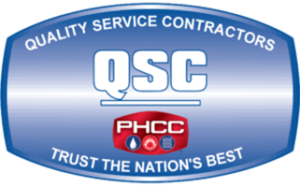Winter water pressure issues are a common problem, especially in busy urban areas like Clarksburg, MD, and Rockville, MD. Freezing pipes, higher water demand, and older plumbing can all contribute to lower water pressure when temperatures drop.
But don’t worry—there are ways to tackle these seasonal challenges. In this guide, we’ll explore why winter can mess with your water pressure and share practical tips to help keep your water flowing smoothly all season long.
How Cold Weather Affects Water Pressure in Urban Areas
Winter isn’t just tough on us; it’s hard on our plumbing too. When temperatures drop, the flow in our pipes can decrease significantly, especially in busy urban areas. Cold weather brings unique challenges to water systems, from frozen pipes to increased demand across multiple households.
Each of these factors can lead to frustratingly low flow and even blockages. Let’s explore these common culprits and see how they disrupt our plumbing during the winter season.
Freezing Pipes
One of the biggest reasons for low water pressure in winter is frozen pipes. When temperatures plummet, water inside pipes can freeze, blocking or severely reducing water flow. This can be especially problematic in older urban areas where pipes may lack sufficient insulation.
When water freezes, it expands and can not only disrupt pressure but also cause pipes to burst, leading to expensive and extensive repairs. Taking precautions, like insulating exposed pipes, can help prevent freezing and maintain steady water flow during winter.
Increased Water Demand
Winter typically brings an increase in water use across households and buildings. People tend to take longer, warmer showers, use heating systems that rely on water and consume more hot water for household chores.
In urban areas with shared water systems, this heightened demand can reduce available pressure for everyone connected to the same supply line.
As water needs increase, the existing system often struggles to keep up, and the pressure can weaken across the board. Addressing this demand by using water more mindfully can help alleviate some pressure-related issues during colder months.
Pipe Materials and Insulation Issues
Many urban areas have older plumbing systems made from materials like iron or steel, which can be more vulnerable in freezing temperatures. These materials can freeze faster and are more prone to corrosion, impacting the flow and pressure of water.
Without proper insulation, pipes struggle to handle colder temperatures, which makes it harder to maintain consistent water pressure. Insulating pipes with foam sleeves or other materials can prevent freezing and maintain pressure. Taking steps to insulate pipes is an effective way to combat these winter water pressure issues.

Common Winter Water Pressure Problems
Winter weather can bring a range of water pressure issues, especially in urban areas where water systems are often interconnected and shared among multiple users.
Cold temperatures, increased usage, and aging infrastructure can all contribute to these common problems. From low pressure in high-rise buildings to issues with broken pipes, let’s explore the specific challenges winter brings to urban water systems.
Low Water Pressure in High-Rise Buildings
High-rise buildings often experience low water pressure during winter due to the added demand and the challenges of pumping water to higher floors. When cold weather strikes, pipes in these buildings may struggle to maintain steady water flow, especially during peak usage times.
Water pressure can also drop if the building’s pump systems aren’t built to handle winter-related demands. Additionally, freezing temperatures can impact pipes on upper floors that are less insulated or exposed to cold air. For residents, this often means slower water flow and frustration, especially when heating needs are high.
Pressure Loss in Shared Water Systems
In urban neighborhoods, water supply systems are frequently shared by multiple buildings, homes, or even entire city blocks. During winter, when everyone’s water use increases, the shared system can experience a significant drop in pressure.
Cold weather can also cause slight freezes or restrictions in the main supply lines, impacting all users connected to it. Older or under-maintained systems are more susceptible to these issues, leading to widespread pressure drops.
This challenge is common in crowded urban areas, where multiple households rely on the same water lines during the busiest times of the day.
Broken or Leaky Pipes
Winter temperatures can be harsh on older pipes, increasing the risk of breaks or leaks that affect water pressure. When pipes freeze, they may crack or burst, allowing water to escape and reducing pressure in connected areas.
Broken pipes are not only inconvenient, but they also lead to significant water waste and repair costs. Even small leaks caused by cold weather can lead to pressure loss over time, as water seeps out rather than flowing directly to taps and showers. Checking for leaks early and taking steps to insulate pipes can help reduce these winter water pressure issues.
Signs of Water Pressure Issues During Winter
Recognizing the signs of water pressure issues early can help you take quick action before minor problems turn into costly repairs.
During winter, there are specific indicators that your water pressure might be compromised due to freezing temperatures, pipe wear, or system strain. Paying attention to these warning signs can keep your plumbing running smoothly all season.
Slow Water Flow
One of the most obvious signs of water pressure trouble is a noticeable slowdown in water flow from your faucets, showers, or hoses. During winter, this can often be due to partial freezing within pipes, which restricts the passage of water.
Reduced flow can also indicate a buildup of ice or debris in the pipes, especially if your plumbing hasn’t been winterized. In urban areas, slow flow can be even more noticeable if the entire building or complex is affected. Addressing this issue promptly is important, as prolonged low flow can worsen if temperatures drop further.
Unusual Noises from Pipes
Hearing unusual sounds like banging, clanking, or even whistling noises from your pipes during winter is often a red flag. Cold temperatures can cause air pockets or ice to form in pipes, creating pressure differences that lead to noise.
These sounds might also indicate that the pipes are expanding and contracting due to the cold, which can cause small cracks or leaks over time. Banging or knocking sounds, known as “water hammer,” are particularly common when frozen pipes start to thaw and water flow resumes. Taking action when you first hear these noises can prevent further issues.
Temperature Fluctuations in Water
If you notice sudden changes in water temperature while using taps or showers, it may be related to water pressure changes. In winter, water pressure issues can cause hot and cold water lines to experience inconsistencies, leading to fluctuating temperatures.
These shifts often happen if your pipes are partially frozen or if shared systems are under heavy demand. Temperature fluctuations can be uncomfortable and might signal underlying issues with your plumbing or water heater. Addressing temperature inconsistencies promptly can help prevent larger pressure problems later.
Solutions for Improving Winter Water Pressure
Winter water issues can be frustrating, but there are several effective ways to address them. Simple maintenance steps and a few adjustments can make a big difference in maintaining consistent flow during the colder months. These solutions help protect your pipes from freezing, minimize leaks, and keep everything running smoothly, even on the chilliest days.
Insulating Exposed Pipes
One of the most effective ways to prevent winter plumbing problems is to insulate any exposed pipes. Cold air can easily reach pipes located in basements, garages, or exterior walls, increasing the likelihood of freezing.
Adding foam pipe sleeves or wrapping pipes with insulation tape helps maintain a stable temperature around the pipes. This layer of insulation reduces the risk of frozen pipes, which can block flow and lead to pressure-related issues.
Insulating pipes is a straightforward and cost-effective step to keep your plumbing system protected from winter’s chill.
Checking for Leaks and Tightening Connections
Even small leaks can have a big impact on your water flow, especially in winter when pipes are more prone to wear. Checking for leaks in faucets, connections, and exposed piping can help catch issues early before they worsen in colder conditions.
Tightening loose connections also prevents water from escaping, which helps keep the flow steady. Additionally, looking for any cracks or signs of dripping around fittings can save you from potential loss and costly repairs. Regularly inspecting and maintaining your plumbing can go a long way in preserving strong flow during winter.
Adjusting Pressure Valves
Pressure-reducing valves (PRVs) help control the force of water in your home’s plumbing system. Adjusting the PRV can improve flow if winter conditions have caused a noticeable drop. Turning up the valve slightly may boost the flow, but it’s essential to avoid over-adjusting, as too much force can strain your pipes.
Most PRVs are located near the main water line entry point and can be adjusted with a simple turn. If you’re unsure about adjusting it yourself, a plumber can assist to ensure the pressure is set to the right level for winter conditions.
When to Call a Professional
Sometimes, winter water pressure issues require more than a DIY approach, especially when dealing with severe or persistent problems. Knowing when to call a professional plumber can save you from further damage and higher repair costs.
A skilled plumber can diagnose and fix winter-related pressure issues quickly, ensuring your plumbing system stays in good shape throughout the season.
Severe Pressure Drops
If you experience a sudden and severe drop in water pressure that doesn’t resolve on its own, it may be time to bring in a professional. This kind of pressure loss often indicates a significant blockage, pipe freeze, or even a mainline issue that requires specialized tools to locate and fix.
A professional can assess the situation accurately, preventing further damage to the pipes and ensuring that your home’s water pressure returns to normal. Ignoring a severe pressure drop can lead to burst pipes and water damage, so it’s best to address it quickly.
Persistent Noises and Leaks
Constant banging, clanking, or leaking sounds from your pipes, especially in winter, can signal serious issues. These noises often indicate problems with pipe expansion, trapped air, or water hammer, all of which can harm your plumbing system if left unchecked.
Leaks are especially concerning, as they not only reduce water pressure but can lead to frozen pipes or structural water damage. A professional plumber can diagnose the cause of these noises and repair leaks, saving you from potentially extensive repairs and keeping your water pressure consistent.
Frozen Pipe Emergencies
If a pipe is completely frozen and you’re unable to thaw it on your own, it’s best to call a professional right away. Frozen pipes can burst if not handled properly, and attempting to thaw them without the right equipment can lead to further damage.
A plumber has the expertise and tools needed to safely thaw pipes and repair any breaks caused by the freeze. Quick action can prevent major water damage and ensure your water pressure is restored as soon as possible.

Tips to Prevent Winter Water Pressure Problems in Urban Homes
Preventing plumbing issues before they start is often the best approach, especially in the winter months when systems are more vulnerable. With a few proactive steps, you can help protect your pipes and maintain consistent flow throughout the season. These tips are simple, effective, and can save you from costly repairs down the line.
Regular Pipe Inspections
One of the easiest ways to prevent winter plumbing problems is to conduct regular inspections of your pipes. Look for signs of wear, corrosion, or minor leaks that could worsen in colder temperatures.
Inspect pipes located in unheated areas, such as basements or garages, where they’re most likely to freeze. Catching small issues early allows you to address them before they escalate into major winter problems. Regular inspections are a simple yet powerful way to keep your plumbing in good condition all year round.
Installing a Pressure Regulator
A pressure regulator can help control the water flow entering your home, ensuring it stays at a safe and consistent level. Winter can cause fluctuations that strain your pipes, especially in shared urban systems.
By installing a pressure regulator, you can protect your pipes from surges that could lead to leaks or bursts. These devices are easy for a plumber to install and can make a noticeable difference in maintaining steady flow even when winter demands are high.
Scheduling Winter Maintenance with Plumbers
A professional plumbing check-up before winter arrives can go a long way in preventing seasonal issues. A plumber can inspect your pipes, check for weak spots, and insulate exposed areas to protect against freezing. Scheduling winter maintenance ensures that your plumbing system is prepared to handle the season’s challenges.
This proactive step can give you peace of mind and reduce the risk of flow-related issues as temperatures drop. Regular maintenance is a small investment that can save you from major headaches in the colder months.
Keep Your Water Flowing Smoothly This Winter with Clarksburg Plumbing
Winter plumbing issues don’t have to disrupt your comfort. At Clarksburg Plumbing, we’re here to help residents in Clarksburg, MD, and Rockville, MD, keep their homes cozy and their water systems running reliably.
From inspections to winter-proofing solutions, our experienced team can tackle all your cold-weather plumbing needs. Contact us today to ensure your plumbing stays protected all season long!
Frequently Asked Questions (FAQ)
Why does my water flow weaken during winter in urban areas?
Cold weather can cause pipes to partially freeze, restricting the water flow and reducing overall efficiency. In urban areas, shared systems are also affected by the increased demand for hot water during winter. Combined, these factors make it common to experience weaker flow during the colder months.
How can I tell if my pipes are frozen?
Signs of frozen pipes include no water coming from certain faucets, unusual noises like banging or whistling in the plumbing, and visible frost on any exposed pipes. If you suspect a pipe is frozen, it’s important to address it quickly to prevent it from bursting, which could lead to serious water damage.
What can I do to prevent reduced flow in winter?
To help maintain steady water flow, start by insulating any exposed pipes, especially those in unheated areas like basements or garages. Checking for leaks and tightening loose connections also helps preserve flow by preventing water from escaping the system.
How can I improve water flow in my apartment or high-rise building?
In multi-story buildings, winter flow issues can often be managed by using water during off-peak times, as this reduces demand on shared systems. Insulating any exposed pipes near your unit and adjusting pressure valves can also improve water flow.
When should I call a plumber for winter plumbing issues?
If you notice severe drops in flow, persistent noises from pipes, leaks, or frozen pipes that you can’t thaw, it’s best to call a professional. Early intervention from a plumber can prevent more extensive problems, such as burst pipes or major water damage.









